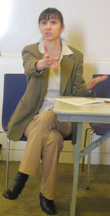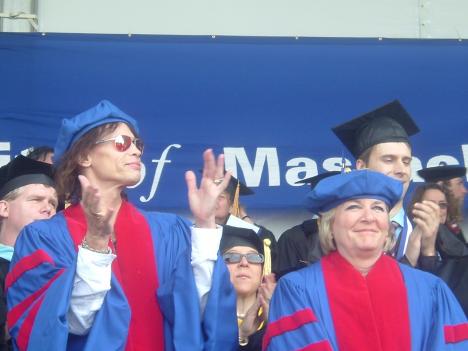Human Rights in Modern Day America

Negar Mortazavi
Felisa Tibbetts extends a helping hand.
April 16, 2005
BY COLIN KELLYStaff Writer
Last Friday, April 8, the UMass Boston Human Rights Working Group (HRWG) presented a discussion entitled “Integrating Human Rights In Higher Education” in the third-floor Founders Room, located in the sparkling-new Campus Center. Over the din of the air vents, Felisa Tibbetts, executive director of the Human Rights Education Associates (HREA), an international NGO, explained the goals of her group.
The Human Rights Education Associates is “an international non-governmental organization that supports human rights learning; the training of activists and professionals; the development of educational materials and programming; and community-building through on-line technologies.
Tibbetts explained that human rights activism and education aren’t an exotic, third world anomaly. Human rights education and human rights activism are both a global necessity integral to fostering “peaceable and just communities” for people to live in, not just in some country whose name has eight consonants, but right here in our own backyard. Human rights issues, like instances of police brutality, imprisonment without trial, freedom of expression, and a child’s right to a decent upbringing are all relevant to modern-day America, not just relics of our sepia-toned past.
Thanks to technology and a newfound global awareness, our world is a smaller place, but it is still difficult to reach out to areas of the world where peoples’ human rights are being violated. Tibbetts explained that, though members of the United Nations all adopt and sign treaties and documents like the Universal Declaration of Human Rights, human rights education is sometimes lost in the shuffle. She said it is difficult for people’s human rights to be protected and upheld if they don’t even know what these rights are. That, in a nutshell, is what human rights education is all about. The UN, Tibbetts said, is attempting to enforce treaties’ human rights education clauses to all treaty-signing nations that either forget or ignore that aspect [I don’t know, it’s hard to not say treaty like eightgabillionfucking times].
After Felisa Tibbetts spoke, the UMB Human Rights Working Group held a panel discussion with chairperson Bryan Gangemi and faculty members Rita Arditti and Rainji Srikanth, all members of the UMB Human Rights Working Group.
According to the group’s mission statement, “The UMB Human Rights Working Group consists of students, faculty, staff and activists from the wider community committed to working for economic, social, and political justice locally, within the context of global struggles for human rights.”
The panel fielded questions from some audience members and underscored Felisa Tibbbetts’ remarks on local community and global human rights education and activism. Also, the panel spoke of the Human Rights concentration the group is working on putting together here at UMass Boston. Introduction to Human Rights is the introductory course for the concentration that will be offered in the spring semester of 2006 under the auspices of the Women’s’ Studies and Anthropology Departments. The faculty slated to be the course’s instructors are Women’s Studies Professor Elora H. Chowdhury and Anthropology Professor Amy E. Den Ouden. The UMB Human Rights Working Group are still in the process of forming the Human Rights discipline, and are currently searching for existing courses to add to the discipline as well as working to create brand new courses of specific relevance to human rights education and activism.
For more information on Human Rights education and activism, and the Human Rights course concentration, contact the UMB Human Rights Working Group at [email protected]. To learn more about the Human Rights Education Associates you can visit them on the web at www.hrea.org.





















































